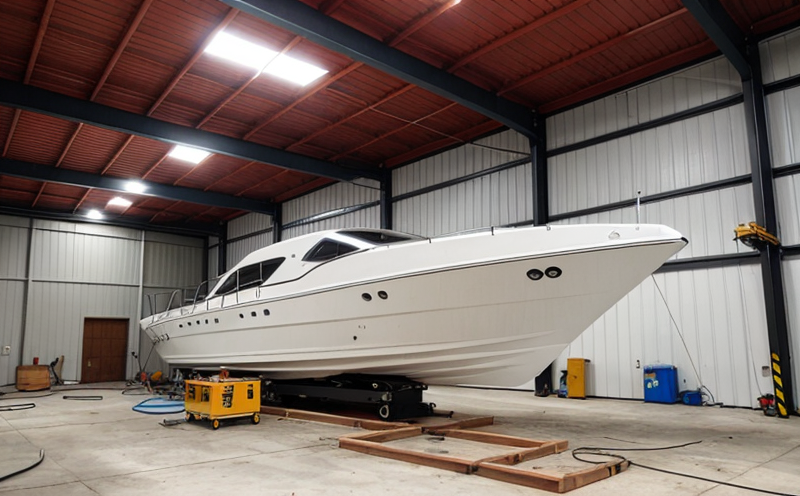ASTM D7136 Impact Resistance Testing of Composite Hull Panels
The ASTM D7136 impact resistance testing method is a critical procedure used in marine and ship equipment testing, particularly for assessing the structural integrity of composite hull panels. This test evaluates how well these materials withstand sudden impacts that might occur during operations at sea or in port environments. The primary goal is to ensure the safety and reliability of vessels by identifying potential weaknesses before they become operational hazards.
Composite materials like fiberglass and carbon fiber are increasingly used due to their high strength-to-weight ratios, which make them ideal for marine applications where durability and resistance against external forces are paramount. However, these materials can also be brittle and prone to cracking under certain conditions. Therefore, understanding how they behave under impact loads is essential for ensuring the longevity of ships.
The ASTM D7136 test involves impacting a sample with a standard weight falling from a specific height onto an anvil positioned at one end of the sample. The impact force and resulting deformation are measured using high-speed cameras, accelerometers, or other sensors. Specimens must be prepared according to strict guidelines outlined in the standard to ensure accurate results.
Understanding the performance characteristics of composite materials under impact conditions helps manufacturers optimize their designs while maintaining safety standards set forth by regulatory bodies such as ISO and ASTM. By conducting regular tests like this one, companies can continuously improve product quality and meet evolving industry requirements.
- Emissions reductions
- Resource efficiency improvements
- Better waste management practices
- Increased recycling rates
The environmental benefits of using composite materials in marine construction extend beyond just the manufacturing process. For instance, reducing overall weight leads to lower fuel consumption during transit, thereby decreasing carbon emissions from ships operating globally. Additionally, proper material selection can lead to better insulation properties within hulls, further contributing to energy savings and reduced greenhouse gas emissions.
In conclusion, ASTM D7136 impact resistance testing plays a crucial role in safeguarding the integrity of composite hull panels used in marine structures. Through rigorous evaluation procedures and adherence to international standards like those specified by ASTM, shipyards can enhance vessel safety while promoting sustainable practices throughout the industry.
Eurolab Advantages
At Eurolab, we pride ourselves on providing comprehensive testing solutions tailored specifically for your unique needs. Our state-of-the-art facilities equipped with advanced equipment ensure accurate and reliable results every time. With a team of experienced professionals who stay current with the latest developments in composite material science, you can rest assured that your samples will receive expert attention throughout each step of the process.
We offer several key advantages over other testing labs:
- Access to specialized instrumentation and software
- Dedicated staff trained in ASTM D7136 procedures
- Comprehensive quality control measures
- Absolutely secure handling of all materials
By choosing Eurolab for your ASTM D7136 impact resistance testing needs, you gain access to unparalleled expertise and resources designed specifically to meet the highest industry standards.
Quality and Reliability Assurance
At Eurolab, we understand that maintaining consistent quality in every test result is non-negotiable. To achieve this goal, we implement stringent internal controls at all stages of sample preparation, testing execution, data analysis, and reporting. Our commitment to excellence extends beyond just following established protocols; it encompasses continuous improvement efforts aimed at enhancing accuracy and precision.
Our quality management system is certified according to ISO/IEC 17025:2017, ensuring that we meet or exceed international requirements for laboratory competence. This certification guarantees that our methodologies are robust enough to produce repeatable results across multiple tests performed on similar samples.
To further enhance reliability, Eurolab maintains strict adherence to the latest versions of applicable standards, including ASTM D7136 and other relevant documents provided by ISO, EN, IEC, etc. Regular audits conducted internally help identify areas for improvement, allowing us to stay ahead of changing regulations and best practices.
Our robust quality assurance protocols are complemented by rigorous calibration procedures performed on all instruments before each use. This ensures that measurements taken during tests remain accurate and consistent over time, providing confidence in the final reports issued by our team.
Environmental and Sustainability Contributions
The choice of materials significantly impacts a vessel’s environmental footprint. By opting for composite hull panels tested using ASTM D7136 methods, shipbuilders contribute positively to sustainability goals. Here are some ways this testing supports broader environmental initiatives:
Reduction in weight: Composite materials are lighter than traditional steel alternatives, leading to decreased fuel consumption and lower emissions.
Better insulation properties: Properly designed hulls can retain heat more efficiently, reducing energy requirements for heating and cooling systems aboard ships.
Recycling potential: Many composite materials are recyclable or contain recycled content, promoting circular economy principles within the maritime sector.
Moreover, by ensuring that hull panels meet strict impact resistance standards through rigorous testing like ASTM D7136, manufacturers contribute to safer operations at sea. Safer vessels mean fewer accidents resulting in pollution events, which ultimately benefits both marine ecosystems and human health.





